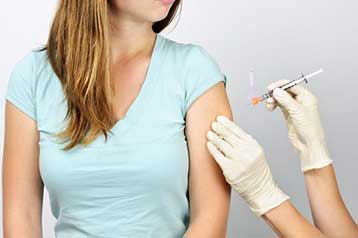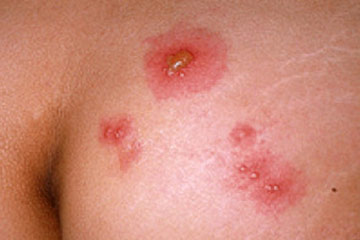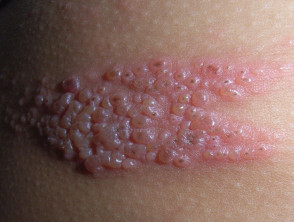Human Papillomavirus (HPV) . Prevention
How can people prevent human papillomavirus (HPV) infection?
There are several ways that people can lower their chances of getting HPV:
HPV vaccine
Vaccines can protect males and females against some of the most common types of HPV. HPV vaccines are given in three doses over six months. It is important to get all three doses to get the best protection. The vaccines are most effective when given before a person's first sexual contact, when he or she could be exposed to HPV.
- Girls and women: Two vaccines (Cervarix and Gardasil) are available to protect females against the types of HPV that cause most cervical cancers. One of these vaccines (Gardasil) also protects against most genital warts. Gardasil has also been shown to protect against anal, vaginal and vulvar cancers. Both vaccines are recommended for 11 and 12 year-old girls, and for females 13 through 26 years of age, who did not get any or all of the doses when they were younger.
- Boys and men: One vaccine (Gardasil) protects males against most genital warts and anal cancers. This vaccine is recommended for boys aged 11 or 12 years, and for males aged 13 through 21 years of age, who did not get any or all of the three recommended doses when they were younger. Young men, 22 through 26 years of age, may get the vaccine.
The vaccine is also recommended for men who have sex with men (MSM) and immunocompromised males through age 26 years, who did not get any or all of the doses when they were younger.
For those who choose to be sexually active, condoms may lower the risk of HPV infection. To be most effective, they should be used with every sex act, from start to finish. Condoms may also lower the risk of developing HPV-related diseases, such as genital warts and cervical cancer. But HPV can infect areas that are not covered by a condom - so condoms may not fully protect against HPV.
People can also lower their chances of getting HPV by being in a faithful relationship with one partner; limiting their number of sex partners; and being with a partner who has had no or few prior sex partners. But even people with only one lifetime sex partner can get HPV. And it may not be possible to determine if a partner who has been sexually active in the past is currently infected. Not having sex is the only sure way to avoid HPV.
How can people prevent HPV-related diseases?
There are ways to prevent the possible health effects of HPV, including two common problems: genital warts and cervical cancer.
Genital Warts
Preventing Genital Warts: One vaccine (Gardasil) protects against most genital warts in men and women (see above).
Cervical Cancer
Preventing Cervical Cancer: Two vaccines (Cervarix and Gardasil) protect against most cervical cancers in women (see above). Cervical cancer can also be prevented with routine cervical cancer screening (Pap test) and follow-up of abnormal results. The Pap test can find abnormal cells on the cervix so that they can be removed before cancer develops. Abnormal cells often become normal over time, but can sometimes turn into cancer. These cells can usually be treated, depending on their severity and on the woman’s age, past medical history, and other test results. An HPV DNA test, which can find certain HPV types on a woman's cervix, may also be used with a Pap test in certain cases. Even women who were vaccinated when they were younger need regular cervical cancer screening because the vaccines do not protect against all cervical cancers.
Anal and Penile Cancer
Preventing Anal and Penile Cancers: One vaccine (Gardasil) protects against most anal cancers. There is no routinely recommended screening test for anal or penile cancer because more information is still needed to find out if such tests can be effective. There are no data on efficacy of the vaccine to prevent cancers of the penis, but most HPV-related cancers of the penis are caused by the HPV types prevented by the vaccines.
Oropharyngeal cancer
Preventing Cancers of the Oropharynx (also called oropharyngeal cancer; cancers of the back of the throat, including the base of the tongue and tonsils): There is no approved test to find early signs of oropharyngeal cancer because more information is still needed to find out if such tests can be effective. There are no data on efficacy of the vaccine to prevent cancers of the oropharynx but most HPV-related cancers of the oropharynx are caused by the HPV types prevented by the vaccines.
Recurrent Respiratory Papillomatosis
Preventing Juvenile-Onset Recurrent Respiratory Papillomatosis (JORRP): Cesarean ("C-section") delivery is not recommended for women with genital warts to prevent JORRP in their babies. This is because it is not clear that cesarean delivery prevents JORRP in infants and children. There are no data on efficacy of the vaccine to prevent recurrent respiratory papillomatosis but most cases are caused by the HPV types prevented by the one of the vaccines (Gardasil).
Source
Centers for Disease Control and Prevention
GeoSalud, january 23, 2014
Related topics:
-
Human Papillomavirus
-
Human Papillomavirus Vaccines: Questions and Answers
-
Human Papilloma Virus Signs and Symptoms
-
Human Papillomavirus Screening
-
Cervical Cancer Screening Tests
-
What Does My Pap Test Result Mean?
-
What Does My HPV Test Result Mean?
-
HPV Test FDA's Approval
-
Human Papillomavirus Treatment
-
Human Papillomavirus Prevention
-
Human Papillomavirus and Men
-
HPV and Men
-
Human Papillomavirus Infection Treatment
-
Human Papillomavirus and Genital Warts
-
Human Papillomavirus Associated Cancers
United States, 2004–2008 -
Preventing Cervical Cancer Worldwide (PDF document)






